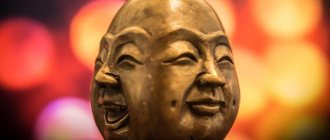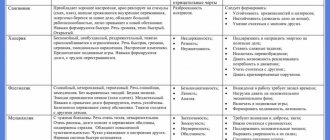The study of different aspects of human personality began in ancient times. Hippocrates identified 4 types of people, psychology later confirmed his research. Temperament is the basic superstructure on which many facets of human personality are formed. It is he who determines the dynamics of mental activity and the possibilities of social adaptation of people.
As a rule, temperament is inherited by a child from one of the parents; also, in the process of upbringing, some character traits are adopted, which can be strengthened.
Articles on the topic
- Poor parenting and its impact on human behavior 08/24/2021
- What does a femme fatale mean and how does she differ from a bitch 06.24.2021
- Types of women in psychology 06/24/2021
- Hysterical personality type of a woman: features of communication 06.16.2021
Briefly about the concept
First, some general information. Before talking about mixed and highly emotional types of temperament, it is necessary to explain what it depends on and how it is formed.
Well, a person has these characteristics from birth. They are of psychophysiological origin and therefore very stable. It is temperament that determines the dynamic characteristics of a person’s states and ongoing mental processes.
At the same time, this characteristic does not affect moral qualities and cognitive abilities in any way. However, temperament must be taken into account when choosing a field of activity. Thus, people with slow reactions will find it difficult to control some mechanisms at high speeds. But they will cope excellently with work that requires perseverance and concentration.
Properties of temperament in psychology
The human psyche reacts differently to different situations and stimuli. The type of temperament depends on several properties that characterize the behavioral characteristics of an individual:
| Property | Description |
| Sensitivity | The degree of force with which it is necessary to influence the psyche in order to obtain a response. Some people easily resist external stimuli, others react quite violently to any reason |
| Reactivity | This property characterizes the speed of an involuntary reaction to any stimulus, be it an unpleasant sound or a sharp tone of voice |
| Activity, ratio of activity and reactivity | These qualities describe a person's reaction to difficulties that he encounters in life. How he is able to cope with various obstacles and trials prepared by fate. Will the person strive, strive to improve his life, is he attentive to detail and how persistent is he in achieving goals? |
| Rigidity and plasticity | Characteristics of human abilities to adapt to external environmental influences |
| Reactive Activity Rate | Speed of mental processes, response to external irritating factors |
| Introversion and extroversion | Characterize the speed of human reaction, how quickly a person is able to make the right decision in an emergency situation |
| Emotional excitability | Gives a description of the force of external influence on a person, which manifests itself in the form of an emotional stimulus |
Sanguines
These are people with a strong, mobile, balanced nervous system. They are distinguished by the following features:
- Activity and communication skills.
- Ability to quickly adapt to new conditions.
- Sociability.
- Ability to quickly understand people and easily establish relationships with them.
- Optimistic, cheerful, cheerful.
- Expressive pantomime and facial expressions, emotionality.
- Dependence on feelings and impulses.
- The ability to experience troubles and solve problems without focusing on the negative.
- Thirst for impressions and change.
Sanguine people take on new things eagerly, but they are productive only in cases where they are inspired. If they are not interested, they will abandon their activities.
The same goes for personal relationships. Saturation is important to them in everything. This is a prerequisite for a happy life for people so filled with internal energy.
Types of temperament
At the beginning of the 18th century, the types of temperament described by Hippocrates were compared with four psychotypes, which served as the beginning of the psychological direction in the study of temperaments. Today, the simple ideas of ancient people are practically no different from those in the 18th century.
- The choleric type is defined as irritable.
- The sanguine type is associated with cheerfulness.
- The phlegmatic type is defined as calm.
- The melancholic type is associated with sadness and excessive impressionability.
In modern psychology, temperament is described as stable and established natural personality qualities that determine the speed of mental activity, regardless of its internal content.
This is interesting: what is degradation?
Cholerics
Before studying mixed types of temperament, you need to briefly talk about the characteristics inherent in people with this characteristic. Cholerics are unbalanced, strong, active people in whom excitement prevails over inhibition. Here are their features:
- Energy and persistence.
- Love being the center of attention.
- Hot temper, lack of restraint, impatience.
- Sharpness, excessive straightforwardness. But there is no hatred in their anger, this is important.
- The rapid emergence of feelings and emotions, their equally rapid fading.
- Expressive gestures and animated facial expressions.
- Tendency to commit rash acts while in a state of passion.
- Ability to improve your results in a competitive environment.
- Energy, initiative, ability to concentrate. But only if they are interested in the matter.
Cholerics also have impressive organizational skills, as well as the ability to quickly form new skills and habits.
Phlegmatic people
These individuals are distinguished by balance, strength and inertia. They are diligent, not particularly active, reserved, and moderately persistent. They manage to remain calm even in very difficult situations. They have the following qualities:
- The ability to adequately respond to what is happening in the outside world.
- Sociability combined with low communication skills.
- Inability to quickly make the right decisions.
- Slow formation of feelings. They arise gradually, but are distinguished by their depth and constancy.
- Patience.
- Susceptibility to affect.
- Poor facial expressions and gestures.
- The ability to restrain and control your emotions.
To summarize, phlegmatic people are slow people in every sense of the word and spheres of life. In everything they are characterized by measuredness and thoughtfulness.
Melancholic people
This temperament is inherent in people with an inert, unstable, weak nervous system. They have decreased activity and increased fearfulness. Melancholic people are distinguished by the following qualities:
- Shyness.
- Closedness.
- Shyness and indecisiveness.
- Impressionability and vulnerability.
- The tendency to deeply experience any life event.
- Restraint in movements and speech.
- Concentration, inability to concentrate.
But melancholic people can be productive. They work well in a familiar environment, and their interests are stable, they are not inclined to scatter themselves and waste their time on trifles.
Emotional excitability
It is a reflection of the line of minimal impact beyond which an emotional reaction occurs, as well as the speed of its development.
Sanguine people, melancholic people and choleric people are characterized by increased excitability. In phlegmatic people it is reduced. The characteristics of temperament inherent in an individual are determined by the unique combination of activity and the severity of emotional reactions to varying degrees. Activity is determined by how intensely a person interacts with the environment.
Today, the scientific community remains confident that the considered properties of human behavior are based on physiology. That is, they are determined by certain features in the functioning of physiological structures. But what kind of structures these are is not yet clear. However, what is indisputable is that temperament is an innate property that serves as the basis for most personality traits, which include character. And the sensual basis of character is temperament.
Choleric-sanguine
But now we can talk about mixed types of temperament. The most common are choleric sanguine people. They can be recognized by one specific feature - their emotions change quickly, but this happens in a slightly more relaxed manner. They go straight to the goal, just like pure choleric people, but the traits of a sanguine person pacify emotionality, adding fruitfulness to the person.
In addition, such people build relationships with others more competently. Individuals with a mixed type of temperament “sanguine-choleric” are not characterized by the principle “everything should be the way I want.”
From a sanguine person, the owner of this type of temperament gets the ability to implement plans. From a choleric person - the ability to organize and generate ideas. In many ways, it is this kind of character that determines the success of such a person.
How to cooperate?
Sanguine colleague
At first glance, a sanguine person is easy to recognize in a team - he is the life of the party. Employees with this temperament are pleasant to talk to and non-conflicting. A sanguine person is an emotional person, a strong and energetic optimist who loves to communicate with interesting and, most importantly, necessary people. He often proposes new projects and gives presentations. He is disciplined, comes to work on time, and leaves it not too late. Works with dedication, but without unnecessary nervousness and fussiness.
Sanguine people are attracted by the opportunity for career growth. And there is no need to interfere with this - he will make a good leader at any level. It is on this basis that dissatisfaction with colleagues may arise, because a sanguine person competes with everyone and in everything. Also, you should not expect special support from him, since he himself does not need it.
Advice to colleagues: Establishing a relationship with a sanguine person is not difficult: demonstrate your undisguised interest in him, laugh at his jokes and talk about his positive qualities. Do this and you will have a friend for the rest of your days. Treat sanguine people well, and they will inspire, motivate, and entertain those around them—just don't force them to follow directions or be meticulous about details.
Melancholic-choleric
A mixed type of temperament, which is less common than the above. People who fit its characteristics have the following characteristics:
- Regularly experiencing periods of apathy and impulsivity.
- A combination of impetuousness with an internal margin of safety.
And if, due to the first feature, these people can suffer emotionally, then the second only plays into their hands. Why? Because at one moment they strive with all their might towards the goal, trying to accomplish something large-scale, but after some time they are suddenly overcome by indifference. What is the advantage here? The fact is that it is during these periods that melancholic choleric people get the opportunity to look at the current situation soberly.
That is why they manage to achieve impressive heights in any field. According to statistics, “pure” choleric people are much less successful. Although it would seem that they have more internal strength.
Techniques
- Rusalova allows you to separate the properties of individuality. Represents one hundred and fifty questions. The subject is presented with standard situations in which it is necessary to give the answer that first comes to mind.
- Belov - the individual is presented with cards on which twenty properties are indicated that characterize each type of temperament. A person chooses those that he has.
- Smirnova helps determine the presence of introversion or extraversion, excitability and balance, fast or slow reaction rate, high or low activity.
- The technique developed by Eysenck – testing represented by questions – achieved the greatest popularity. The subject is asked one hundred questions characterizing human behavior. If the individual agrees with the statement, he puts a “+” sign; if not, then “-”. It is important that the answers are quick and honest. Such a questionnaire allows you to identify the level of psychoticism, extraversion, introversion, and neuroticism.
- Obozov allows you to find out the typology of temperament, even in the absence of the subject. Fifteen character traits are given, and the person chooses the level of manifestation of each of them. For example, there is a scale of balanced behavior, where you need to choose what is more suitable for a particular person. It can be either “excellently balanced” or “well balanced.” Depending on what level of manifestation was chosen, a certain number of points is given. At the end, points are tallied. The type that scores the most points is determined as priority.
You need to understand that you cannot find out exactly what kind of temperament a person has. Some personality traits may wax or wane throughout life.
Now you know how to determine your temperament type. Choose the method that suits you or try different options. Remember that knowing a person’s temperament makes communicating with him much easier. We must not forget that an individual can begin to adjust his behavior when he recognizes his strengths, as well as weaknesses, and become better.
Melancholic-phlegmatic
Mixed types of temperament, defined by psychology, were discussed above. There are only two of them. But in modern science there is an opinion that there are neither “pure” temperaments, nor specifically mixed ones (that is, they can be combined in different ways).
If a person combines the traits of a phlegmatic and a melancholic, then others perceive him as a very detached, even strange person. Somehow it combines passivity and slowness with increased anxiety and excessive worry. That is, something will worry him very much in his soul, but he will not strive to correct the situation.
Also, this mixed type of temperament causes low human productivity. His main problem will be a lack of initiative, even a certain aloofness.
A matter of temperament
Svetlana Mironchuk on how to get along with people of different types of temperaments
We spend a lot of time in the workplace, side by side with other people. We are friends with someone or have friendly relations, with someone we communicate only on business matters. It’s good if relations with colleagues are friendly, but disagreements also happen. Often the cause of problems is the incompatibility of characters and temperaments: if a colleague is too emotional, and you are used to resolving everything quietly and peacefully, it is unlikely that there will be conflicts. However, there are several tricks to avoid such clashes: for example, determine the employee’s temperament type and build communication based on their characteristic characteristics.
How to recognize?
Character is personality traits that are manifested in a person’s actions and determine his hobbies, principles and worldview. It is quite possible to get along with him - to close your eyes to some shortcomings or to join other people's beliefs, views, interests. And temperament is the innate personality traits that form the basis for character development. You can't change temperament, you can't change it.
Sanguine-phlegmatic
A very interesting combination. The sanguine-phlegmatic person is a mixed type of temperament, giving its owner emotionality and concentration. There is also positivity and sociability here.
People with this temperament overcome any difficulties. And it will seem to others that they are not even making any special efforts. Of course, this is not true, it’s just that the inherent strength of spirit in these people does not allow them to give up.
They often have a large number of friends. But they manage to calmly set priorities, so they can always sacrifice personal ones.
It is also worth noting that these people are also not characterized by absent-mindedness and irresponsibility. The team loves them, and their superiors appreciate them.
Sanguine-melancholic
But this is a very paradoxical combination. Sanguine-melancholic is a mixed type of temperament that combines opposing, conflicting character traits.
Often the owner himself suffers from these contradictions. The temperament itself manifests itself in an unusual way: its owner can behave like a sanguine person in life, but if some strong psycho-emotional shock occurs in life, he will become a real melancholic.
These are the people who can be dramatically unsettled by a negative event that affects the most important area of their life. After this, they can become melancholic for a long time. And those around them will completely stop recognizing them as the former positive and active person.
Temperament changes
Temperament is formed from the moment of the birth of life, but life circumstances can adapt and edit it during the course of life. An example would be an extreme situation in which a 100% melancholic person, for a certain time, can simultaneously turn out to be 100% choleric in his actions.
The common people believe that temperament cannot be changed. This belief is incorrect, since changing one’s own temperament is subject to the will of a person. Trained individuals have the skills to select it at their own discretion, based on a particular current situation. But to learn this, you need to spend a lot of time.
Choleric-phlegmatic
And this combination needs to be discussed when discussing the characteristics of mixed types of temperament. It's actually quite harmonious. Because both choleric and phlegmatic people have common features. And in a person representing this type of temperament, they are enhanced.
In addition, periodically occurring choleric emotional outbursts are softened - here the thoroughness inherent in a phlegmatic person comes into play.
In general, such a person can be characterized as a calm and stable person, but not passive. He has a certain reserve of inner strength, which constantly activates and spurs him on. And sometimes even choleric traits take precedence over phlegmatic ones. This happens if a keen interest appears in a particular matter, igniting a certain spark in a person’s soul.
Note to the manager
Knowing the essence of the matter at least in general terms, a sanguine person can brilliantly conduct a conversation with anyone. As you know, sanguine people are good speakers. Therefore, they should be given the floor more often at various meetings and conferences. However, technical issues in work often cause difficulties for sanguine people. You shouldn’t trust them with monotonous, conveyor-type work that requires constant attention.
Phlegmatic colleague
The phlegmatic person is unhurried and thorough, possesses enviable equanimity and composure. This is a peace-loving and restrained person who is difficult to anger. He does not like innovation and is generally quite conservative.
A phlegmatic person is not inclined to be a leader: he can work both in a team and independently. He has smooth and friendly relationships with colleagues and easily adapts to the mood and atmosphere of the team. It is calm and pleasant to communicate with phlegmatic people, because it is known in advance that the interlocutor will not flare up without a good reason, and will not start shouting if he does not like something in the statements. The dialogue will always be constructive, objections will be logical and reasoned.
Communicating with phlegmatic people can be difficult because it is difficult to recognize their emotional reaction to everything that others do and say. One can only guess how this person perceived something, and whether he was offended. Also, phlegmatic people can easily gain fame as bores - they like to tell something in detail and in too much detail, so sometimes it becomes boring in their company.
Advice to colleagues: To achieve his respect, you need to share his values - work conscientiously, not commit rash actions, and especially not force him to participate in them! A phlegmatic person will like it if you come to him for advice, and then listen with interest and without objections.











